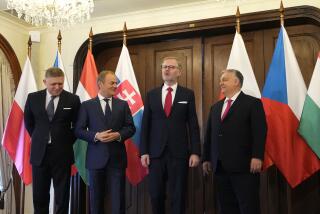Some Soviets Denounce 1968 Invasion
- Share via
ROME — Liberal Soviet lawmakers, watching the popular demand for political and economic reforms swell in Czechoslovakia, said here Monday that the time has come for Moscow to declare that the Warsaw Pact’s suppression of the 1968 “Prague Spring” was wrong and a setback for socialism.
At a news conference prior to this week’s visit to Italy of President Mikhail S. Gorbachev, four members of the Congress of Peoples’ Deputies, the Soviet Parliament, said they would support a resolution condemning the Soviet-led invasion.
Arguing that the Soviet Union’s own reforms, as well as those beginning in Eastern Europe, depend on a candid reassessment of the Prague Spring, the legislators said that such a resolution is both a matter of justice and a political and ideological necessity.
The Parliaments of both Hungary and Poland, which also sent contingents of troops into neighboring Czechoslovakia in August, 1968, to crush the liberalization there under Alexander Dubcek, have already passed resolutions condemning the invasion and their countries’ participation.
A similar resolution from Moscow would confirm--even more dramatically--the Soviet declaration, now frequently reiterated, that each country, including the Kremlin’s socialist allies in Eastern Europe, has an absolute right to determine its own policies, its own political course.
“The Soviet leadership clearly understands and, I would say, solemnly declares that freedom of choice is one of the primary principles of our foreign policy,” said Andrei Grachev, deputy head of the Soviet Communist Party’s International Department.
Queried about the turmoil in Czechoslovakia, Grachev said, “I do not see any specific aspects that could influence the principle of the Soviet Union on this question, which would distinguish the situation in Czechoslovakia from our positions on events, changes or simply internal developments in Poland and the German Democratic Republic (East Germany).”
This point has been made with greater and greater firmness as Moscow’s East European allies--first Hungary and Poland but now Bulgaria, Czechoslovakia and East Germany as well--have broken with the rigid orthodoxy of the past in a search for solutions to their accumulated political, economic and social problems.
Gorbachev himself on Sunday reaffirmed Moscow’s commitment to this principle of independence and to efforts to give socialism “a human face,” a phrase used in the 1960s by Dubcek, then the Czech leader, in introducing democratic reforms in his country.
Sergei Alexeyev, chairman of the Legal Affairs Commission of the Supreme Soviet, the Soviet Union’s legislature, said here that a resolution condemning the invasion of Czechoslovakia is necessary as a guarantee against such future interference in other socialist countries and as a correction of past errors in Soviet foreign policy.
“The principle of freedom of choice is considered by us a universal right and is applied generally, including to ourselves and to other socialist countries,” Alexeyev said. “It must be honored everywhere and in all circumstances.”
Parks, The Times’ Moscow bureau chief, is on assignment in Italy.
More to Read
Sign up for Essential California
The most important California stories and recommendations in your inbox every morning.
You may occasionally receive promotional content from the Los Angeles Times.












